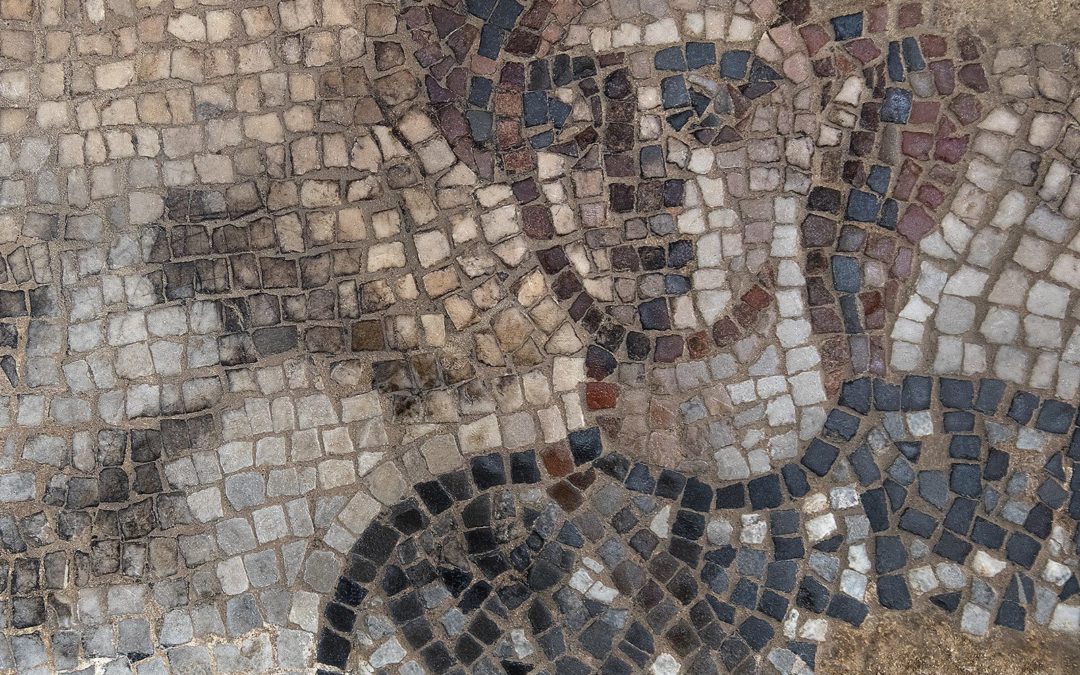
by Kathryn Post, RNS | Jul 28, 2022 | Commentary, Headline News |
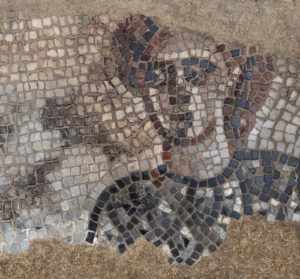
(RNS) — The earliest known depiction of biblical heroines Jael and Deborah was discovered at an ancient synagogue in Israel, the University of North Carolina at Chapel Hill announced last week. A rendering of one figure driving a stake through the head of a military general was the initial clue that led the team to identify the figures, according to project director Jodi Magness.
“This is extremely rare,” Magness, an archaeologist and religion professor at UNC-Chapel Hill, told Religion News Service. “I don’t know of any other ancient depictions of these heroines.”
The nearly 1,600-year-old mosaics were uncovered by a team of students and specialists as part of The Huqoq Excavation Project, which resumed its 10th season of excavations this summer at a synagogue in the ancient Jewish village of Huqoq in Lower Galilee. Mosaics were first discovered at the site in 2012, and Magness said the synagogue, which dates to the late fourth or early fifth century, is “unusually large and richly decorated.” In addition to its extensive, relatively well-preserved mosaics, the site is adorned with wall paintings and carved architecture.
The fourth chapter of the Book of Judges tells the story of Deborah, a judge and prophet who conquered the Canaanite army alongside Israelite general Barak. After the victory, the passage says, the Canaanite commander Sisera fled to the tent of Jael, where she drove a tent peg into his temple and killed him.
The newly discovered mosaic panels depicting the heroines are made of local cut stone from Galilee and were found on the floor on the south end of the synagogue’s west aisle. The mosaic is divided into three sections, one with Deborah seated under a palm tree looking at Barak, a second with what appears to be Sisera seated and a third with Jael hammering a peg into a bleeding Sisera.
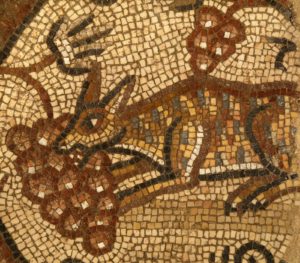 Magness said it’s impossible to know why this rare image was included but noted that additional mosaics depicting events from the Book of Judges, including renderings of Sampson, are on the south end of the synagogue’s east aisle. According to the UNC-Chapel Hill press release, the events surrounding Jael and Deborah might have taken place in the same geographical region as Huqoq, providing at least one possible reason for the mosaic.
Magness said it’s impossible to know why this rare image was included but noted that additional mosaics depicting events from the Book of Judges, including renderings of Sampson, are on the south end of the synagogue’s east aisle. According to the UNC-Chapel Hill press release, the events surrounding Jael and Deborah might have taken place in the same geographical region as Huqoq, providing at least one possible reason for the mosaic.
“The value of our discoveries, the value of archaeology, is that it helps fill in the gaps in our information about, in this case, Jews and Judaism in this particular period,” explained Magness. “It shows that there was a very rich and diverse range of views among Jews.”
Magness said rabbinic literature doesn’t include descriptions about figure decoration in synagogues — so the world would never know about these visual embellishments without archaeology.
“Judaism was dynamic through late antiquity. Never was Judaism monolithic,” said Magness. “There’s always been a wide range of Jewish practices, and I think that’s partly what we see.”
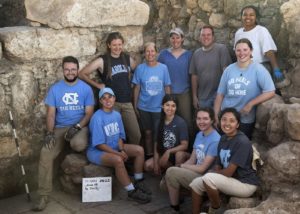 These groundbreaking mosaics have been removed from the synagogue for conservation, but Magness hopes to return soon to make additional discoveries. The Huqoq Excavation Project, sponsored by UNC-Chapel Hill, Austin College, Baylor University, Brigham Young University and the University of Toronto, paused in 2020 and 2021 due to the pandemic and is scheduled to resume next summer.
These groundbreaking mosaics have been removed from the synagogue for conservation, but Magness hopes to return soon to make additional discoveries. The Huqoq Excavation Project, sponsored by UNC-Chapel Hill, Austin College, Baylor University, Brigham Young University and the University of Toronto, paused in 2020 and 2021 due to the pandemic and is scheduled to resume next summer.
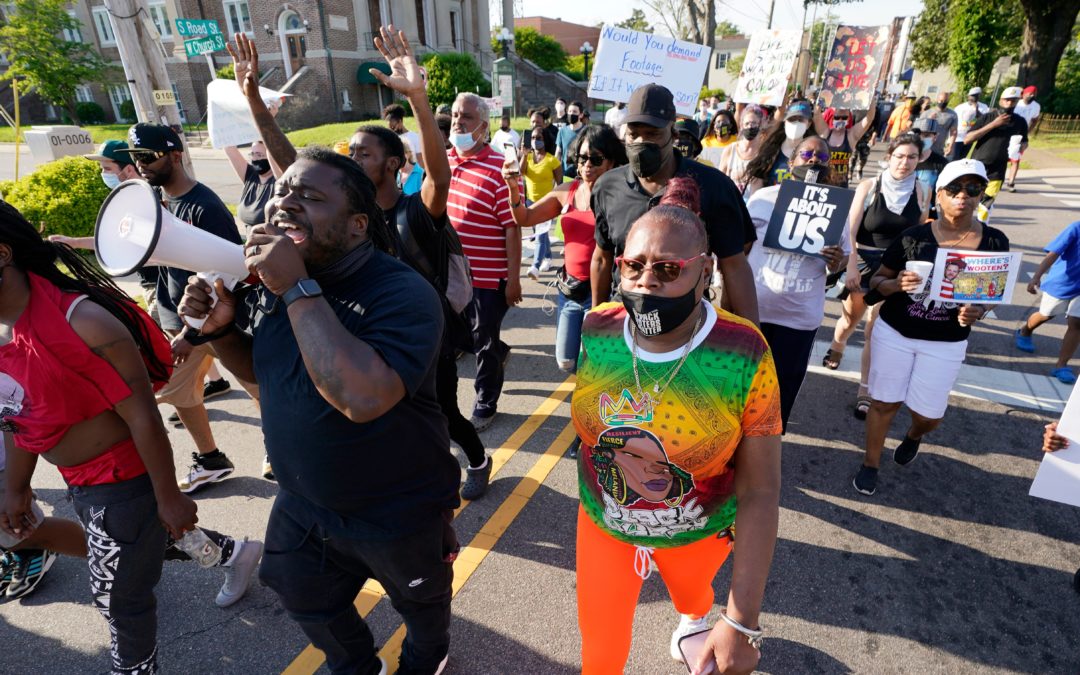
by Yonat Shimron, RNS | May 5, 2021 | Headline News, Social Justice |
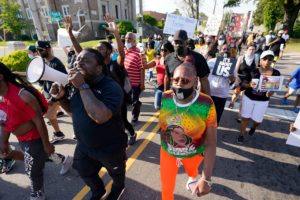
by Yonat Shimron, RNS
(RNS) — Many of North Carolina’s prominent clergy have called for police reform and accountability in the wake of George Floyd’s killing by former Minneapolis police Officer Derek Chauvin.
But the killing of Andrew Brown Jr., a 42-year-old man shot and killed by sheriff’s deputies in eastern North Carolina’s Elizabeth City, a town of 18,000 people on the bend of the Pasquotank River, is personal.
Brown died of multiple gunshot wounds — at least one to the back of the head — on April 21, as deputies served a warrant for drug charges. Coming one day after former Minneapolis police Officer Derek Chauvin was found guilty of second-degree murder of Floyd, Brown’s killing brought out deeper cries for justice from the state’s top religious leaders. His funeral will be held Monday (May 3).
Brown’s death served as a stark reminder that Chauvin’s conviction is not enough to reform a persistent pattern of unarmed Black people dying at the hands of law enforcement.
In North Carolina, where Blacks constitute 21% of the population but are twice as likely as whites to die at the hands of law enforcement, according to a project called Mapping Police Violence, the killing of Brown has stoked a renewed passion for change.
And no one has expressed as much pain and indignation at the killing as civil rights leader the Rev. William J. Barber II, co- chair of the Poor People’s Campaign: A National Call for Moral Revival.
Barber grew up in Washington County, 50 miles south of where Brown was killed. His parents’ lifelong mission was to desegregate the public schools in the region, which resisted desegregation until well into the late 1960s and early 1970s.
On Wednesday, a judge said he would not consider releasing body-cam images for at least another month while the state conducts its investigation.
Barber and other clergy are demanding the full release of body-cam video of the killing and for the case to be handed over to North Carolina’s attorney general. The family of Brown, which has seen a short snippet of the video, has called his killing “an execution.” (An autopsy showed Brown was shot five times.)
“A warrant is not a license to kill, even if a suspect supposedly drives away,” Barber said. “A warrant does not mean a person is guilty. A warrant is not permission to shoot someone, possibly with assault rifles, multiple times.”
A coalition called Justice for the Next Generation, led by the Rev. Greg Drumwright, protested Sunday at the Elizabeth City Courthouse.
In Elizabeth City, where Blacks make up 48% of the population, a march through the city earlier this week drew several clergy leaders. Those included the bishop of the North Carolina Conference of the United Methodist Church, the presbyter of the Presbytery of New Hope and the presiding bishop of the Eastern North Carolina Episcopal District of the AME-Zion Church.
“What I see this time around is, ‘Oh, my gosh, now it happened here, too,'” said the Rev. Jennifer Copeland, executive director of the North Carolina Council of Churches. “When it happens in your backyard you pay more attention to it and you get a little more involved in the different actions occurring. I do believe that’s happening.”
The council is planning a vigil on May 6.
Barber, who has made numerous visits to Elizabeth City, has reminded people of the South’s stumbling efforts to overcome a legacy of racism. He said he could count at least five Black men from Eastern North Carolina who were wrongly accused of murder and later exonerated. To this day, people of color are underrepresented in the court system, the judicial system and the police department.
“This is where I was raised,” Barber told RNS. “It brought back: Why am I 58 years old and still having to see and deal with what my father dealt with when I was 12 and 13 years old?”
Barber will deliver what he called “words of comfort” to the family during Monday’s private funeral for Brown at Fountain of Life Church in Elizabeth City. The Rev. Al Sharpton will deliver the eulogy.
A visitation for family and friends took place Sunday.
Elizabeth City has seen nights of street protests and the imposition of overnight curfews as people from the state and beyond have marched on the city to demand racial justice.
Barber and other clergy are planning another press conference next week.
by Wil LaVeist | Sep 5, 2012 | Feature, Headline News |

NO LOOKING BACK: Democratic delegates and supporters waved “Forward” placards at the Time Warner Cable Arena in Charlotte, North Carolina, on Sept. 4, the first day of the 2012 Democratic National Convention. (Photo: Robyn Beck/Newscom)
The contrast in diversity was striking on the screen.
The sea of red, yellow, white, black, and brown faces at the Democratic convention in Charlotte last night compared to the sea of white with black and brown specks at the Republican event last week in Tampa. It’s like watching color TV vs. black and white.
But is it really?
Nowadays we talk about red (Republican) and blue (Democratic) as code for conservative and liberal, but as the Democrats take their turn this week and re-nominate the first African American POTUS, I wonder how many black Democrats know their party’s history is much redder than the GOP when it comes to black people and other minorities. In fact, the DNC’s founding fathers would be red with rage that Barack Obama is the party’s leader.
You certainly wouldn’t know this by viewing the DNC’s website on your computer. The opening paragraph of the African American section reads:
“For decades, Democrats have stood with the African American community in the struggle for equality and the enduring struggle to perfect our nation itself.”
Really?
The section about the party’s history reeks with campaign spin:
“For more than 200 years, our party has led the fight for civil rights, health care, Social Security, workers’ rights, and women’s rights. We are the party of Barack Obama, John F. Kennedy, FDR, and the countless everyday Americans who work each day to build a more perfect union.”
This is followed by a timeline with the entry being 1920.
C’mon now. Your official founding date is 1792, making the Democrats the nation’s oldest political party, yet your timeline begins in 1920? Is it because you are also the party of President Andrew Jackson that promoted the bloody takeover of Indian lands and the expansion of slavery? Is it because you are the party of President Andrew Johnson, the Confederate who during Reconstruction championed laws leading to Jim Crow that re-shackled black freedom for decades after the Civil War?
I was reared in a Democratic household in Brooklyn, New York, to parents who were union loyalists. My initial DNC history reached only as far as FDR and the New Deal. But as I came of voting age I sought the backstory for myself. In a word, it is racist.
The party of Obama had for centuries championed a laundry list of oppressive policies that have led to the tragic disparities and the areas of health, wealth, education, housing, and incarceration rates that continue to plague the African American community today. However, that revelation then didn’t stop me from voting my interest such as, helping David Dinkins to become New York’s first black mayor in 1990.
The truth before 1920 and after is easily accessible via several legit Web sites. Of course Republicans pointed this out themselves in 2008, no doubt as a way of throwing stones at then-Sen. Obama’s magical run for the White House.
What’s curious is why the DNC doesn’t openly embrace its full history — that the party that once championed slavery has produced the nation’s first African American president. Wouldn’t that show how far the party has led nation, though there’s still a ways to go? Wouldn’t that illustrate “change we can believe in,” and progress “forward?” Wouldn’t that show respect for blacks, a constituency that is supposed to be highly valued? DNC leadership obviously decided on the history revision. Where are the black Democratic leaders on this? Where are the whites who are supposed to be progressive?
For me, it shows that both parties share a common problematic history on the issue of race. One doesn’t want to hear about it, while the other doesn’t want to talk about it. This hasn’t changed much over the years. People have just switched sides and traded names.
Real change would be seeing a sea of colorful faces at both conventions, and two parties focused on meaningful policies rather than spin. I don’t expect it to happen in my lifetime, though.
But then again, I said the same about a black man becoming President of the United States.
by Wil LaVeist | Jun 26, 2012 | Feature, Headline News |

ACQUITTED SINNER: Former Sen. John Edwards and family last month outside the federal courthouse in Greensboro, North Carolina, where he was found not guilty on one of six counts of campaign corruption. The judge ruled a mistrial on the other five. (Photo: Chucky Liddy/Newscom)
The campaign-corruption trial of former U.S. Sen. John Edwards is history now. His former mistress, Rielle Hunter, with whom he had a daughter, is now on tour promoting her memoir, What Really Happened: John Edwards, Our Daughter, and Me. She announced during a TV interview that she and Edwards are no longer a couple, but will continue raising their daughter together. Soon, both will be out of the news cycle, but their saga possibly offers a lasting lesson for many Christians concerning this question about sin and crime.
A jury found Edwards, an admitted sinner, not guilty on one count that he accepted illegal campaign contributions in order to hide his adulteress affair. The jury deadlocked on five other similar counts. The acquittal hasn’t totally exonerated Edwards of campaign finance crimes, but the U.S. State Department dropped the case anyway.
Edward’s sin with Hunter occurred while he was campaigning for the presidency of the United States and while his late wife, Elizabeth, was dying of cancer. Like many men (and women) caught in an immoral self-inflicted bind, Edwards lied and lied until the truth, as it always does, eventually came to light. Many people who paid attention to the case agree that Edwards was put on trial more so as punshment for being unfaithful to his dying wife and for his hubris to believe he could sneak his secret into the White House.
And so Edwards publicly confessed his sins (which the Bible, in 1 John 1:9, states will be forgiven) before God and the world. However, should the government criminalize a sin that basically affects only the imperfect consenting adults involved? Should the church get riled about certain sins, while giving a pass to others?
I’ve been wondering about this most recently since President Obama announced in a TV interview in May that he supports same-sex marriage. The president caused an uproar among many Christians that still simmers, including among many of his supporters in the black church. But should the government, under political pressure from the church, legislate against same-sex marriage, especially when in America two consenting heterosexual adults can marry and divorce without the church being involved? Should most Christians insist that same-sex marriage be illegal, when homosexuality is actually listed in the Bible equally among other sexual sins, including adultery, that are not federal crimes?
A sin is a transgression against divine law for which Christians believe the sinner will be accountable at the judgment seat. The sinner mainly puts him or herself at risk with God. A crime is an action against the people that injures the “public welfare.” Like a drunk driver who runs a stop sign, or an armed robber, committing a crime puts several innocent people potentially at great risk. The government, working on behalf of the people, therefore has a duty to prevent crimes and punish criminals. Does the same duty apply to non-felonious sins?
Obviously many sins are also crimes such as, for example, being a serial killer. But what injury does same-sex marriage between two consenting adults cause to the public welfare? Is it more severe than adultery? Is it more destructive than divorce, a sin that often tears families and wounds innocent children? God allows divorce (which should be a last resort when reconciliation fails) under certain circumstances. Neither adultery nor divorces are federal crimes. Thankfully America is a democracy — a nation of Christians, believers of other faiths, agnostics and atheists, who for the most part believe in preserving the separation of church and state, and not a theocracy, as in living under Sharia law.
A recent CNN/ORC poll indicates that the majority of Americans believe same-sex marriage should be legal. Perhaps they’re saying it should be treated like adultery or divorce; it may be wrong, but people deserve the free-will right to choose who they want to (or don’t want to) be in a committed personal relationship with.
During closing remarks, Edwards’ attorney Abbe Lowell reportedly told the jury, “This is a case that should define the difference between a wrong and a crime … between a sin and a felony. John Edwards has confessed his sins. He will serve a life sentence for those.”
Perhaps Christians who are adamantly against two consenting same-sex adults having the legal right to marry should adopt this reasoning, too.
by Christine A. Scheller | May 24, 2012 | Feature, Headline News |

Rev. Dr. Elizabeth Conde-Frazier: ‘Immigration is a trauma. Even if you came here and you are a citizen, immigration is still traumatic.’
“Conversations on immigration are more often politicized than humanized,” marketing text says for the Rev. Dr. Elizabeth Conde-Frazier’s new bilingual book, Listen to the Children: Conversations with Immigrant Families. In the book, which is a finalist in ForeWord Review’s 2011 Book of the Year awards, she attempts to change both the reality and the discussion by sharing immigrant families’ stories and by offering parenting advice to those in the midst of immigration journeys. Conde-Frazier is vice president of education and dean of Esperanza College in Philadelphia. She is also is an ordained American Baptist pastor with more than ten years ministry experience. UrbanFaith talked to Conde-Frazier about the book and about how Christians should think about illegal immigration. The interview has been edited for length and clarity.
UrbanFaith: Why did you write Listen to the Children?
Elizabeth Conde-Frazier: I wrote the book while I was professor at the Claremont School of Theology in California. Part of my job was working with students from the Latin American Bible Institute. A lot of them came from families that were a mix of persons who had or did not have citizenship and it led to conversations and to my doing workshops around the country. And so, I started to understand the issues of the people, of the pastors working with the people, of the Sunday school teachers, of the social workers and so forth.
In North Carolina, I did a five-hour presentation with this community, which allowed me time to be with the parents. When we sat down to eat, a lot of children were sitting at the table with us. There had been a roundup of persons at a particular place of employment, and I looked at the reaction of the children to the conversation about this. They recoiled; they became very fearful; they left the table; they began to cry. This was hard enough for the adults. But, for the children it was even more so.
Having been a teacher myself, I realized the children were not able to articulate their feelings. And so, I later spent time sitting on the floor in this room where they were playing. Rather than asking them questions, I began to use felt puppets to tell the story of Ruth and Naomi and how they had immigrated. Then I allowed the the children to retell me the story with the same figures. In doing so, the children used the figures to tell their own stories. I began to see how they were feeling. When I finished my time with that community, they came to me and said, “Where is your book on all of this that you have presented to us? We need you to write a book.” That to me felt like a call, and so that’s what I did. But I wrote the book not so much from the perspective of the adults, but for the children and their needs.
What are the primary challenges these children experience?
Immigration is a trauma. Even if you came here and you are a citizen, immigration is still traumatic. Let me create a metaphor for you to describe it. If I take a bunch of dominos and I stand them up and create a pattern with them, that is life the way we know it, where we are sure about the different institutions and how life is, how the culture names things, what our traditions are that create parameters around our identity and so forth. If I take my fists and bang them on the table, the dominos fall apart and the patterns that are there fall apart. Some of the dominos may even fall on the floor. That’s how immigration feels. The patterns of life and everything about life as you know it falls apart. You may try to rebuild, but there are pieces that you lose in the process.
Then, on top of that, if I take a bunch of marbles and I roll them out on this same table with the dominos, now you’ve got all these elements of life that you have no idea how to manage. You have to take the dominos, which are the things that you think you know how to manage and you have to use them in new ways to keep all these marbles from falling all over the place. In the midst of your trying to do that, I can continue to come back and bang my fists again, and the things that you thought you had begun to construct again once more fall apart.
When children are living in the midst of that, it is very traumatic. It says there’s no routine, there’s no structure, and the most important thing that children need in life is routine and structure. The routine creates the structure. Not having work creates chaos and poor families don’t have a sense of structure. That affects the child’s intelligence. That affects their ability to organize their thoughts, it affects how their brains are formed and so forth. Putting together life parameters, relationships, and so forth becomes twice as difficult.
Children also have a sense of abandonment. The adults can leave them at any point. They have no control over any of those things. Trust cannot be built. When families are separated for long periods of time, you see how difficult it is for children to reconnect to parents and parents to children. And so, there’s this continuous sense of loss that people are experiencing, but they can’t quite put their finger on it.
How can those of us who may be in relationship with immigrant children support them and their families?
In everyday life we are on committees in the community perhaps, we have food banks, we may be in the PTA, wherever we are, we can find opportunities to help change or expand the agenda of that place so that it is sensitive to those who may be alternately documented. 
If a church has a program to the community and is serving these persons, then they need to be aware of how their program can address these needs, or how they can partner with others so that rather than being limited only to what their program has to offer, they have a network of other programs to pull from in a moment of crisis.
Advocating for the laws at this time is very important. Writing to our different legislators does make a difference. Legislators do listen to that. What does it take to have a night where you serve soup and bread? I say soup and bread, because it’s a very simple meal and it’s probably what persons who have just arrived here are going to have to eat. In solidarity, what we do with this evening is we pray, we have this meal, we write these letters, we talk about the issues, and we send the letters out. It forms the compassionate heart of a people of God who do justice. And what does God require of us in Micah? Whatever it takes that we can internalize persons who are different from ourselves, whose lives are different, that’s what we want to do as the faith practice of the church.
Given your target audience’s transience, how will readers find the book?
Remember that there is the network of churches and families. That is a network that’s beyond marketing. They pass it along. For example in the summer, I teach in Texas. People come from both sides of the border to learn. They’re pastors and lay persons and they’ll use the book. They’ll take it back across the border. The section on preparing children for border crossing or separation is helpful not only to people who might be thinking of immigrating, but it is also helpful to persons who may have already done so. It allows them the opportunity to reflect on what they did or didn’t do, so that then they can ask themselves, “Oh, what do I need to do at this point, because I did it this way or that.”
How would you respond theologically to those who may criticize you for providing helpful information to people who may be planning to do something illegal?
First of all, the theological piece has to be informed by a political piece, because theology is not done in a vacuum. People need to realize that the laws of our country and the free-trade laws are taking land away from people and making it impossible for many of the farmers [in Latin American countries] to survive. Those countries do not have the safety net that we so far have. And so, I would love to see those critics find themselves hungry, with nothing to feed their children, with no way of having a job and prayers that seem to go unanswered. I’d love to see how they would stay within the confines of what they call law.
What Christians need to ask themselves is: “When is the law unjust?” If it is unjust, then it is not a law according to the purposes of God. Our response to that should be that the church is called to denounce unjust law. Corrie ten Boom was a Christian. We glorify her story because she saved the Jews. She broke the law of her time. Today, after the fact, we say, “Oh how wonderful!” We’re also okay with those who break the law in China because they become Christians, but we’re not okay with people breaking the law because they’re hungry, or because the law is unjust?
I recall from research I did for an article I wrote in 2006 that the number of legal immigration slots for Latin American countries is the same as that for countries with whom we don’t share a border. Is that still the case?
Yes, it is. And the thing for people to look at is the following: The United States has a history of always needing cheap labor. Ever since we had enslavement, we have needed cheap labor. It’s just which immigrant group gets to be the cheap labor. That changes. In order for us to ensure that cheap labor what we do is we create an underclass of people with the law. So we say, on one hand, “We need you to come and work,” but on the other hand, we create laws that say, “If you come, we can’t give you citizenship; we can’t give you your benefits and your rights as a human being.”
Matthew 25 speaks about what human rights are. It speaks about it in the language of the kingdom of God. And so, for someone to eat, to drink, to dress, to be sheltered, to have human companionship, those are the things that are important for sustenance, and the kingdom of God is about sustenance. When we have laws that do not provide for the sustenance of a group of persons, then we are the ones who are against the law, but it’s the kingdom law that we are against.
There’s a discussion in the book about the “worthiness” of immigrants and you advocate using terminology like “alternately documented” and “uncertain” or “precarious” status instead of “illegal alien” and “undocumented.” What’s wrong with using language like “illegal alien”?
The most important thing for Christians is to recognize the Imago Dei, the image of God in all human beings, because to do so is to honor God. To fail to do so and to shut our wells of compassion is to dishonor God. How we call one another needs to reflect what we truly believe. I don’t believe that you are the only one who is in the image of God just because you happen to come to my church or you look like me, or you’re a citizen like me. All human beings are. When we do mission work—and these churches are very happy to go out and do mission work—is it only because it makes them feel good? Or is it because they believe in the image of God in others?
And so, the theological and biblical roots of worthiness come from there. Worthiness also comes from the laws in the Old Testament about how we are to treat those who are foreigners in our midst and how we are to treat the poor and the widows in our midst. There should be no one who is poor in our midst. There should be no on who is discarded in our midst. The words we use have to reflect honor. Rather than using words that reflect distance from others and categorizing them as not being a part of ourselves, we should use words that demonstrate the ministry of reconciliation. In 2 Corinthians 5, we’re called to be ambassadors of reconciliation. “Illegal” and “alien” are words that reflect disconnect with others and say they’re not my neighbor, so I don’t have to watch over them. They are words that go along with a current in our country, and around the world really, that categorizes human beings politically as being far away from us, and not deserving of any type of rights as the rest of us, whereas in the eyes of God, that is not how to do it. And so, we need to use words that allow the space for worthiness.


 Magness said it’s impossible to know why this rare image was included but noted that additional mosaics depicting events from the Book of Judges, including renderings of Sampson, are on the south end of the synagogue’s east aisle. According to the UNC-Chapel Hill press release, the events surrounding Jael and Deborah might have taken place in the same geographical region as Huqoq, providing at least one possible reason for the mosaic.
Magness said it’s impossible to know why this rare image was included but noted that additional mosaics depicting events from the Book of Judges, including renderings of Sampson, are on the south end of the synagogue’s east aisle. According to the UNC-Chapel Hill press release, the events surrounding Jael and Deborah might have taken place in the same geographical region as Huqoq, providing at least one possible reason for the mosaic. These groundbreaking mosaics have been removed from the synagogue for conservation, but Magness hopes to return soon to make additional discoveries. The Huqoq Excavation Project, sponsored by UNC-Chapel Hill, Austin College, Baylor University, Brigham Young University and the University of Toronto, paused in 2020 and 2021 due to the pandemic and is scheduled to resume next summer.
These groundbreaking mosaics have been removed from the synagogue for conservation, but Magness hopes to return soon to make additional discoveries. The Huqoq Excavation Project, sponsored by UNC-Chapel Hill, Austin College, Baylor University, Brigham Young University and the University of Toronto, paused in 2020 and 2021 due to the pandemic and is scheduled to resume next summer.





